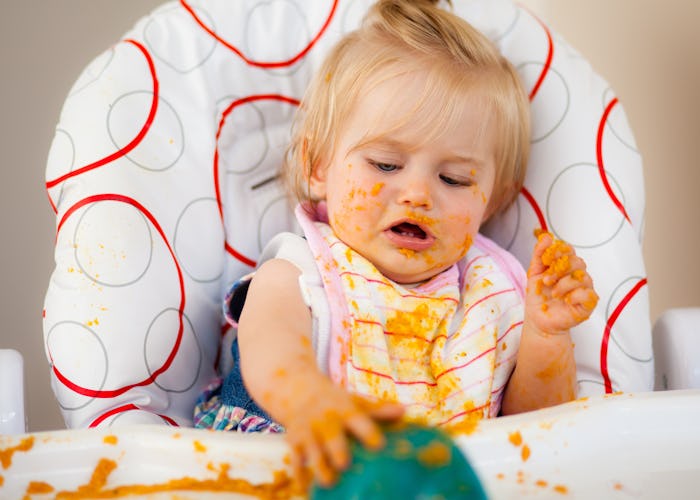Life

If Your Toddler Hates Spoons, It's Totally OK To Just Go With It
So you’ve purchased all the colorful, character-covered fork and spoon sets Target has to offer in the hopes your toddler will finally get excited about using them. And then those cute tot-sized utensils end up on the floor yet again. Is it OK if your toddler won't use utensils after all these tries? Not to worry — hating on their new fork and spoon is part of the process.
Feeding specialist and occupational therapist Judy Delaware tells Romper it's very common for toddlers to prefer eating with their own hands over using utensils. “Children first learn to self-feed using their hands, and they get really good with grasping and getting the food to their mouths. They love being able to do this all on their own and at their own pace," she says. "When we introduce to them a utensil, this complicates their speed of getting their food into their own mouths. It might even cause some frustration. Think ‘hangry!’ Just get out of my way. I need food!”
Registered dietitian Anita Mirchandani explains that all babies eat differently, and the skills and preferences they develop affect how they prefer to eat as toddlers.
“Traditionally, kids who are spoon-fed from the start may start learning how to use a utensil around 12 months of age; of course, it’s a work in progress. Some babies who are fed through baby-led weaning may not want to use utensils because they are used to feeding themselves with their fingers. That’s also OK. The pincer grasp is important to develop, so if you see that happening and getting better over time, then the ability to feed themselves using utensils will happen over time,” Mirchandani explains.
If your kiddo is in the group who would rather throw their utensils across the room than use them to eat, is it OK for them to keep using their hands? While you might be ready for the messy eating stage to end and get on with the spoons and forks, you may just need to be patient.
“Parents should allow their child to use their hands, but be aware that behind the scenes the parent should continue to model how to use utensils and offer the child the exposure and experiences of how to hold and release utensils with their eventual goal that the child becomes more proficient in the use of utensils,” says Delaware.
When you’re trying to help your toddler be successful using a spoon, Delaware suggests loading it up for them with a thicker food, like avocado or hummus, that won’t just roll right off. She also suggests parents try a technique called hand-over-hand, where the adult places a hand over the toddler's hand and gently (without force) guides the utensil to the child's mouth.
With this technique, you can also teach them not to throw the spoon immediately after. Yes, it is possible!
“The best part is, you can let your hand linger near the child after the food goes into their mouth, and request for the spoon to be returned into your hand, and voila — you just taught your child how not to throw,” says Delaware.
She says a child should be able to bring a spoon to their mouth at around 12 to 15 months old and start scooping up food and feeding themselves anytime after that age. By their second birthday, they should be pretty successful little utensil users. Mirchandani says the important thing is encouraging your little one to keep trying and being supportive when they do. She also reminds concerned parents not to stress too much.
“You want to be able to see your kids try,” Mirchandani says. “It may not be perfect or the exact right way, but that’s fine. They should develop the motor skills which happens over time and with practice for many kids. If you’re not happy with what you see, perhaps an occupational therapist would be good to consult."
Experts:
Judy Delaware OTR/L, CLC, co-founder and feeding specialist at Feeding Littles LLC
Anita Mirchandani, MS, registered dietician